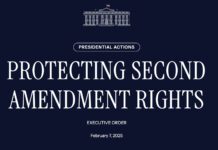I’m looking at a remarkable opinion by Massachusetts District Court Associate Justice John F. Coffey, who ordered on August 3, 2023, that the state’s prohibition on non-residents bearing arms for self-defense without obtaining a state license to carry is a violation of their Second Amendment rights. This has major implications for concealed-carry reciprocity across the country.
Judge Coffey wrote in the case of Commonwealth of Massachusetts v. Dean F. Donnell, “An individual only loses a constitutional right if he commits an offense or is or has been engaged in certain behavior that is covered by 18 USC section 922. He doesn’t lose that right simply by traveling into an adjoining state whose statute mandates that residents of that state obtain a license prior to exercising their constitutional right. To hold otherwise would inexplicably treat Second Amendment rights differently than other individually held rights. Therefore, the Court finds that GL. 269, sec. (10a) is unconstitutional as applied to this particularly situated defendant and allows the motion to dismiss on that ground.”
The defendant in the case, New Hampshire resident Dean Donnell, was charged in Lowell (Mass.) District Court with carrying a firearm without a Massachusetts license. Donnell filed a motion to dismiss the charge, claiming that the Massachusetts law was unconstitutional on its face. Adjacent New Hampshire is a permitless carry state, so adults who can legally possess a firearm there may open-carry or concealed-carry in public without a NH license, which the Granite State issues for reciprocity.
Judge Coffey noted that Donnell “was in compliance with his home state’s laws on the possession of the firearm” when Massachusetts charged him. Donnell was facing a mandatory minimum sentence of 18 months in prison under GL. 269.
“This Court can think of no other constitutional right which a person loses simply by traveling beyond his home state’s border into another state continuing to exercise that right and instantaneously becomes a felon subject to mandatory minimum sentence of incarceration,” Coffey wrote in his ruling.
This firearms case is another fruit of Bruen, which I covered in the August 2022 issue. The full name of the landmark gunowner-rights court case is New York State Rifle & Pistol Association, Inc., et al. v. Bruen. That Supreme Court case established that if conduct such as Mr. Donnell’s was “clearly covered by the Second Amendment,” the Commonwealth of Massachusetts needed to show a historical tradition “relating to disparate treatment of nonresidents” to uphold the law. Donnell’s brief, submitted by counsel Alexandra M. Brunnell, argued that “Requiring non-residents to obtain licenses violates the Second Amendment because there is no historical analogue burdening the right to interstate travel.” So Coffey held that the state failed to meet its burden in proving that Mr. Donnell’s conduct in the event was not constitutionally protected and warranted a felony charge.
Judge Coffey wrote in his order, “The Commonwealth points to no historical precedent limiting the reach of one’s exercise to a federal constitutional right to only within that resident’s states borders.” Further, “The logical conclusion to the Commonwealth’s argument is that an ‘ordinary law abiding’ resident of the state of New Hampshire can become a felon merely by traveling into the state of Massachusetts.”
This is by no means the end of this case. But for now, kudos to Mr. Donnell and his team.



























